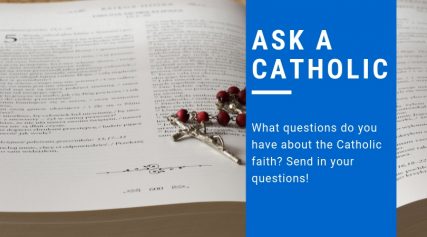What questions do you have about Catholicism? Submit them online, or fill out the form below.
By Mitch Finley
What is original sin?
The topic of “original sin” is one laden with historical, biblical, and theological complexities, so we don’t have the space here to say all that should be said about it. (Here’s a good essay on the scriptural and historical background of the topic) So, I will limit myself to a brief explanation of the contemporary Catholic understanding.
“Original sin” is a common religious term that never occurs in the Bible but is rooted in interpretations of both Scripture and sacred tradition. With regard to the latter, the 5th-century theologian and Saint Augustine of Hippo had a profound impact on what became the standard understanding of original sin.
Depends on Interpretation
This standard understanding, based on a literal interpretation of the Adam and Eve story in Genesis, declares that human nature was corrupted due to the first sin by Adam and Eve. Therefore, all humans are inherently sinful. This understanding can’t be found, per se, in the Bible, and certainly not in the New Testament. Rather, it came from combining various biblical passages. The first formulation of this understanding came from St. Augustine, as noted above.
Some religious thinkers suggest that original sin is an unnecessary and even false concept. This naive suggestion leaves us, however, with no explanation of the problem of evil and the “shadow side,” if you will, of human nature. While a literal interpretation of the Adam and Eve story probably isn’t helpful, there is no denying the impact of original sin on human history and human relationships. Modern history provides no small number of examples, from the industrialized slaughter of six million Jews and others perpetrated by Germany’s Nazi regime during World War II to recent mass shootings carried out by deranged, hate-filled individuals in our own country. On a personal level, the actions of everything from individual Holocaust denyers to clerical abusers of children and violence in marriages bear witness to human wickedness.
The “Catechism of the Catholic Church” sums up the contemporary Catholic understanding of original sin thus:
In its various forms—material deprivation, unjust oppression, physical and psychological illness and death—human misery is the obvious sign of the inherited condition of frailty and need for salvation in which man finds himself as a consequence of original sin (no. 2448).







